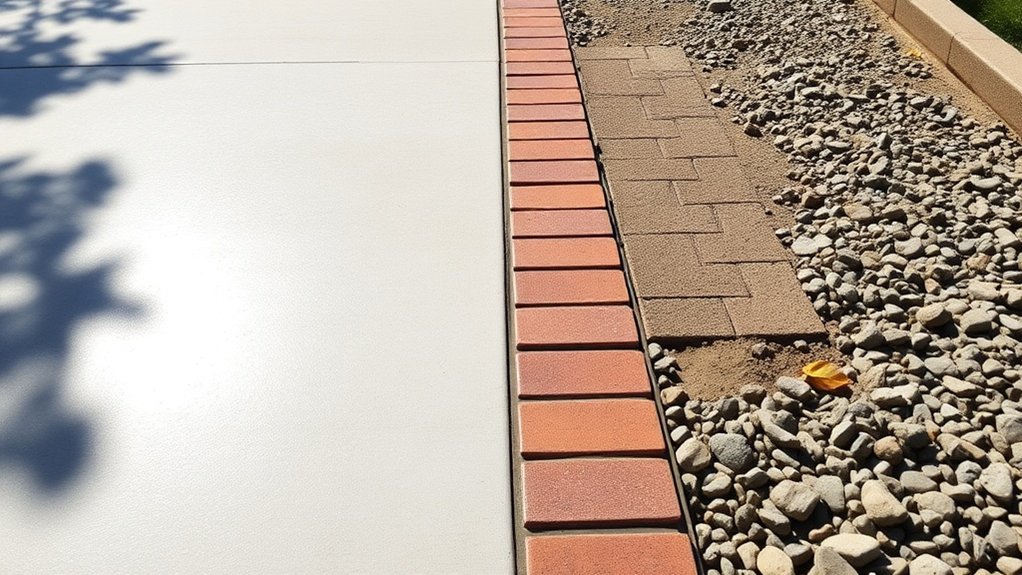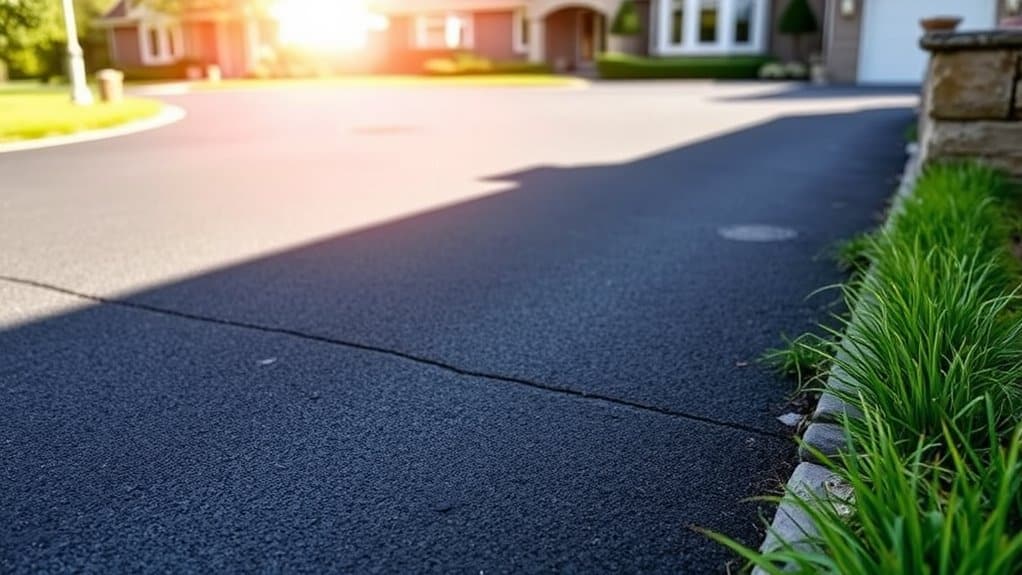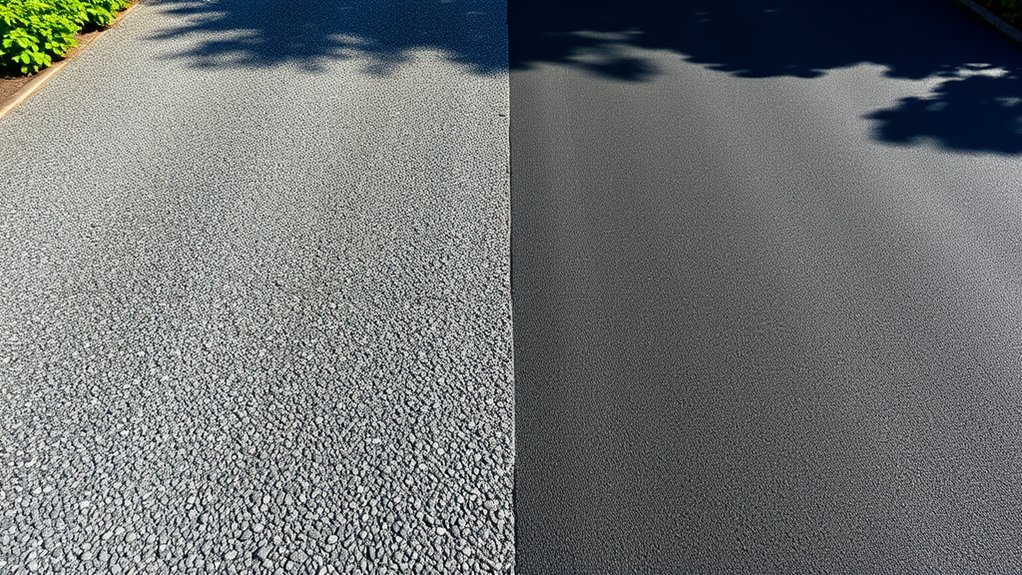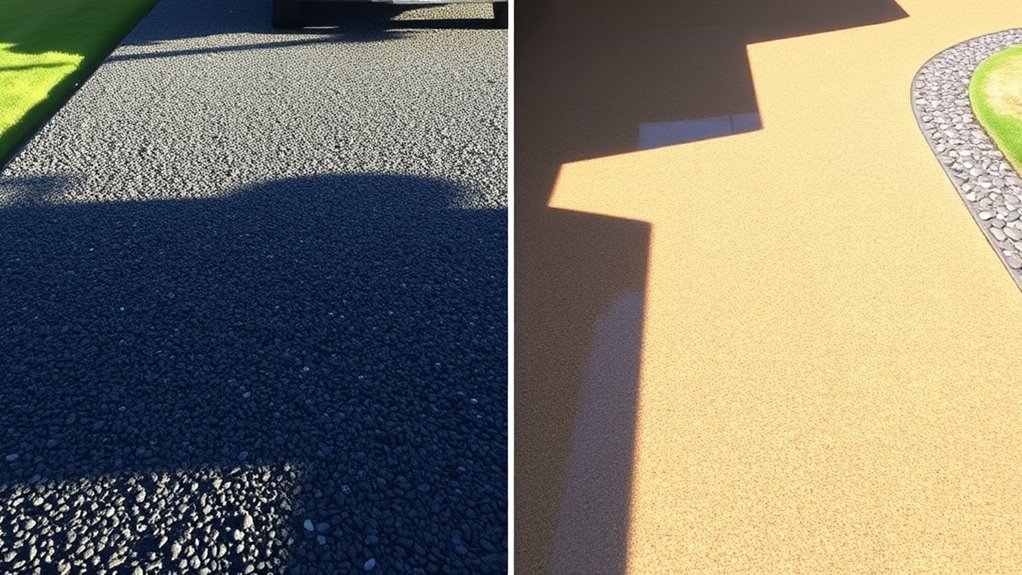If you want the cleanest driveway material, concrete driveways are the best choice. Their smooth surfaces resist stains and dirt, making maintenance straightforward. While asphalt and block paving are durable options, they require more attention, such as resealing and joint refilling. Gravel driveways tend to be messy and need regular upkeep. Selecting the right material can keep your driveway looking its best, and there’s more to explore about each alternative.
Table of Contents
ToggleKey Takeaways
Which Driveway Material Stays the Cleanest?
- Concrete driveways are the top choice for cleanliness, thanks to their smooth surfaces that are easy to clean and maintain.
- Brick and permeable paver driveways also do a good job at staying clean, needing minimal upkeep and an occasional power wash.
- Asphalt driveways are easier to clean than gravel, but they require resealing every few years to keep their dirt-resistant properties intact.
- Gravel driveways rank lowest for cleanliness, as they need regular maintenance to prevent shifting and maintain an even surface.
- Opting for a cleanable material can improve your driveway’s appearance and reduce long-term maintenance costs.
Overview of Driveway Materials
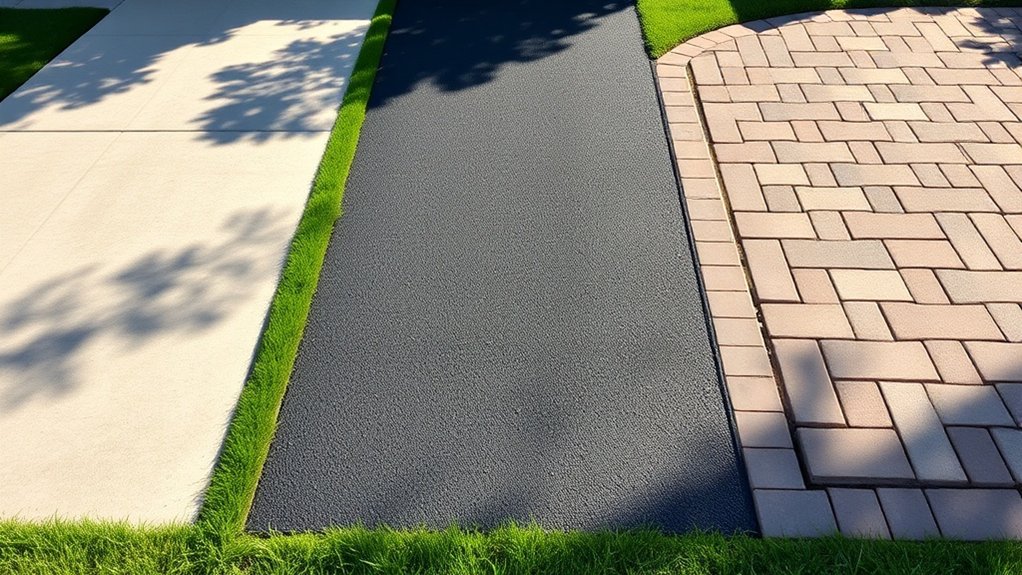
When choosing a driveway, there are several materials to consider, each with its own advantages.
Asphalt driveways are affordable and durable, lasting up to 30 years with proper care. However, they come in limited colours, which might affect the overall look of your property. Additionally, asphalt driveways require regular sealing for maintenance, making long-term maintenance costs a significant factor in your decision.
Gravel driveways are quick to install and have excellent drainage, but they require regular maintenance and can shift over time, making them less stable.
Brick driveways offer a timeless appearance with various colours and patterns, but they tend to be pricier and need more upkeep.
Permeable pavers stand out for their durability and eco-friendliness, providing good drainage while improving the visual appeal of your driveway.
Ultimately, your choice will depend on your budget, preferred style, and how much maintenance you’re willing to undertake.
Cleanability of Concrete Driveways
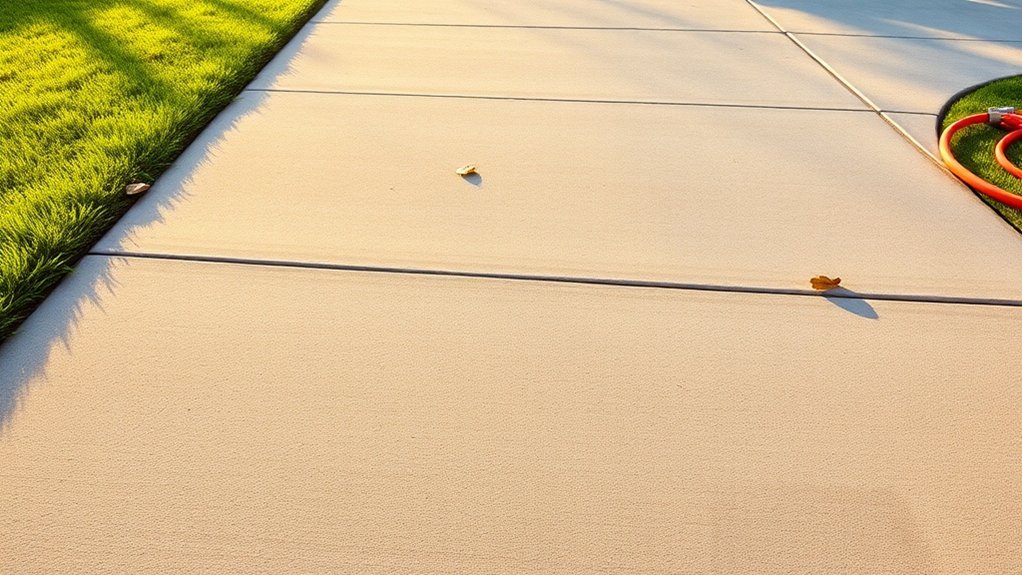
To keep your concrete driveway clean, it’s essential to understand how to resist stains. Implementing effective cleaning and maintenance practices, along with sealing your driveway, is crucial. These steps not only improve cleanliness but also extend the lifespan of your surface. For instance, using a suitable sealant can prevent oil and dirt from penetrating the concrete, making it easier to clean. Regularly cleaning your driveway can help prevent buildup from turning into stains. Additionally, using appropriate cleaning products enhances the effectiveness of your maintenance routine.
Stain Resistance Strategies
To keep your concrete driveway looking its best, it’s important to understand stain resistance strategies, as different types of stains affect cleanability in various ways. Here’s a brief overview:
| Stain Type | Durability | Moisture Impact |
|---|---|---|
| Acid Stains | High (20-30 years) | Moisture-resistant |
| Water-Based Stains | Moderate | Prone to fading |
| Reactive Stains | High | Possible colour variation |
| Non-Reactive Stains | Low | Susceptible to damage |
Effective moisture management during the staining process is essential to avoid problems like efflorescence and discolouration. Proper sealing of the driveway will also enhance your driveway’s durability and simplify cleaning, ensuring a visually appealing and functional surface for years to come. When choosing a stain, consider that acid-based stains create a translucent, variegated look that can significantly improve the overall aesthetic of your driveway.
Cleaning and Maintenance Tips
Keeping your concrete driveway clean and well-maintained is essential for stain resistance. Here are some straightforward tips to keep it looking its best:
- Set a cleaning schedule: Aim for an annual clean, and consider a deep clean twice a year for busy areas.
- Prepare before cleaning: Always sweep away leaves and debris, and check for any cracks before you start.
- Opt for eco-friendly cleaners: Warm soapy water, baking soda, or vinegar work well for general cleaning.
- Use the right tools: A stiff-bristled brush and a garden hose will help you scrub and rinse effectively.
Following these simple steps will help maintain your driveway’s appearance and longevity.
Sealing Importance Explained
Sealing your concrete driveway is crucial for keeping it clean and extending its lifespan. The benefits of sealing are clear: it creates a protective barrier that repels moisture and prevents damage from freezing and thawing, which can lead to cracking and spalling.
There are various types of sealants available, ranging from matte to glossy finishes, enhancing the look of your driveway while also resisting stains. A sealed surface fills tiny pores, making it easier to clean spills without them soaking in. This can save you money in the long run, as you’ll spend less on stain removal and repairs.
To keep your driveway in top condition, it’s advisable to reseal it every one to three years, depending on traffic and weather conditions. Investing in high-quality sealants not only safeguards your driveway but also maintains its aesthetic appeal and boosts your property’s value.
Maintenance of Asphalt Driveways
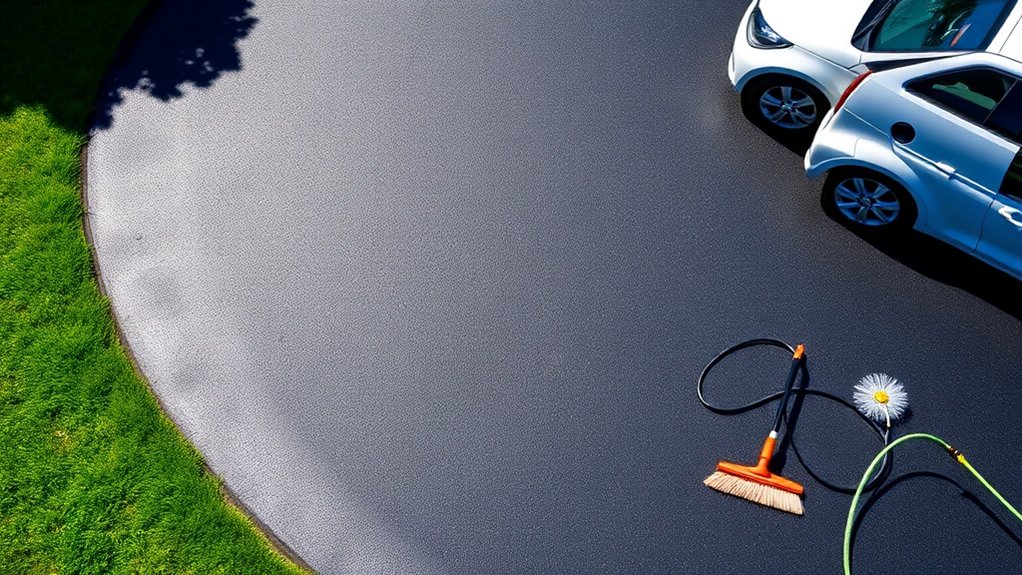
Maintaining your asphalt driveway is crucial for its durability and appearance. Aim to seal it every few years, employ effective cleaning methods, and take steps to prevent stains.
For instance, using a pressure washer can help remove stubborn dirt, while a quick application of sealant can protect against the elements.
Sealing Frequency Importance
The frequency of seal coating your asphalt driveway is crucial for its longevity and appearance. Here are some straightforward recommendations:
- Residential driveways: Seal every 2–3 years for optimal protection.
- High-traffic areas: Seal every 1–2 years due to increased wear and tear.
- New asphalt: Apply the first seal coat 6–12 months after installation.
- Climate considerations: In harsh weather, consider sealing annually.
Effective sealing techniques prevent oxidation and water damage, while also improving the overall look of your property.
Cleaning Techniques Overview
To keep your asphalt driveway in top condition and prolong its lifespan, regular cleaning is crucial. Aim to clean it monthly to prevent dirt accumulation and stains.
Start by removing loose debris with a leaf blower or broom. Use non-metallic scrub brushes to avoid scratching the surface. For more thorough dirt removal, you might find rotary brooms or power sweepers effective.
If spills occur, act quickly—absorb oil with cat litter before scrubbing with dish soap and warm water. You can also use asphalt-specific degreasers or eco-friendly alternatives like vinegar and baking soda.
When pressure washing, keep a steady motion and use the lowest effective pressure setting. Always rinse thoroughly and let the driveway air dry completely before using it again.
Stain Prevention Strategies
Five key strategies can help you prevent stains on your asphalt driveway and keep it looking its best.
To minimise stain absorption and maintain a clean appearance, consider these simple measures:
- Seal your driveway regularly to create a protective barrier against oil and grease.
- Use absorbent mats under vehicles to catch any leaks before they reach the asphalt.
- Clean spills promptly—the quicker you tackle them, the easier they’ll be to remove.
- Sweep regularly to remove debris that could trap oils and lead to staining.
Challenges of Gravel Driveways
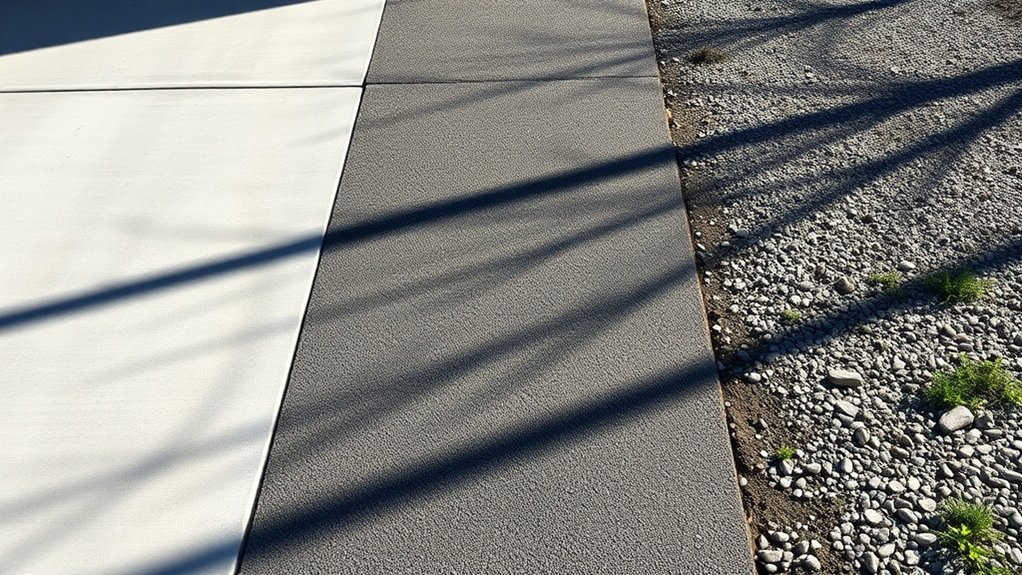
Gravel driveways have their charm, but they also come with challenges that can affect both their look and usability. A key issue is drainage; if water isn’t managed properly, it can pool, leading to erosion and uneven surfaces. To sort this, ensure your driveway is well graded and consider adding drainage solutions like French drains.
Another problem is surface stability. Regular vehicle traffic can cause the gravel to shift and create dips. To keep your driveway even, rake and regrade it regularly, and compact the layers to prevent air pockets that lead to ruts.
Weeds can also be a nuisance in gravel driveways. Routine weeding and the application of herbicides are necessary to keep them at bay.
Advantages of Paver and Brick Driveways
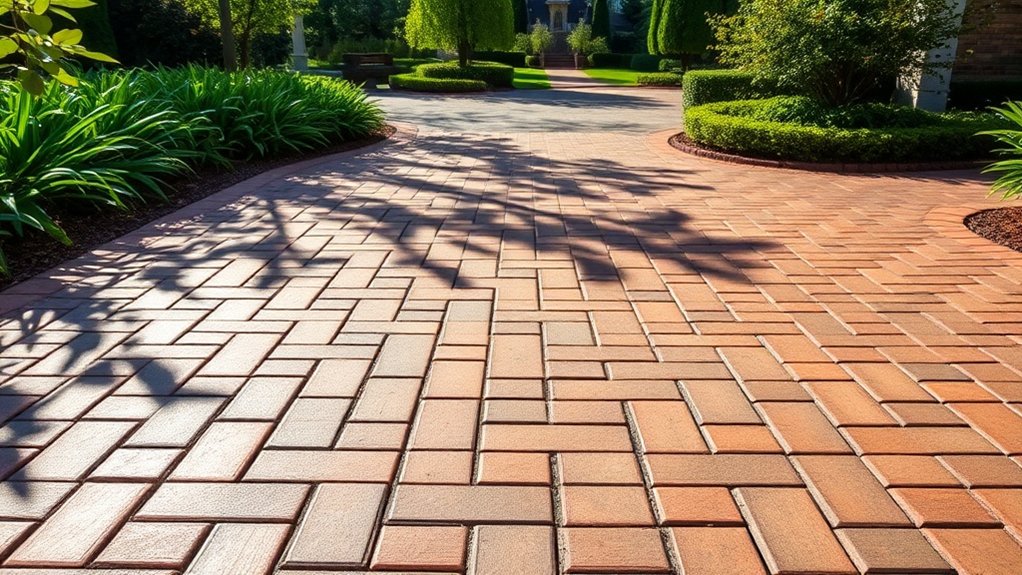
Paver and brick driveways have several advantages that make them a popular choice for homeowners, especially when compared to gravel driveways.
Here are some key benefits:
- Durability: Pavers can last for over 50 years, flexing with ground movement, while brick offers a timeless aesthetic with its classic appeal.
- Easy Repairs: If a paver or brick gets damaged, it can be replaced easily without major disruption, making repairs straightforward and hassle-free.
- Low Maintenance: Keeping your driveway looking fresh is simple; a bit of power washing and occasional sand reapplication will do the trick.
- Design Versatility: Pavers are available in a variety of colours and patterns, boosting curb appeal, while brick provides a charming, traditional look.
Opting for paver or brick driveways is a smart investment in enduring beauty and practicality for your home.
Eco-Friendly Cleaning Solutions
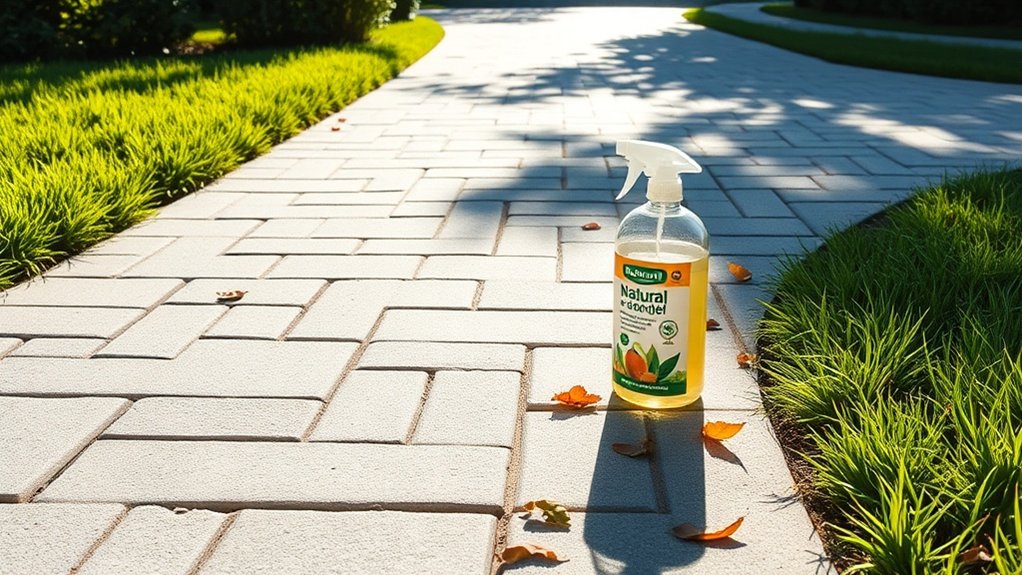
If you want to keep your driveway clean without harming the environment, eco-friendly cleaning solutions are a great option.
Oxygen-based cleaners effectively remove oil and grease stains without using harsh chemicals. Enzymatic cleaners break down organic matter well, while citrus and vinegar solutions are safe for lighter cleaning tasks.
Although tougher stains may need a bit more elbow grease, these alternatives are still quite effective. Specialty surfactants can also target grime without corrosive ingredients, ensuring they’re safe for your surroundings.
You can even make your own mixtures with baking soda and vinegar for a personalised approach. Choosing these eco-friendly options helps keep your driveway clean while protecting the planet.
Overall Ranking of Driveway Materials for Cleanliness
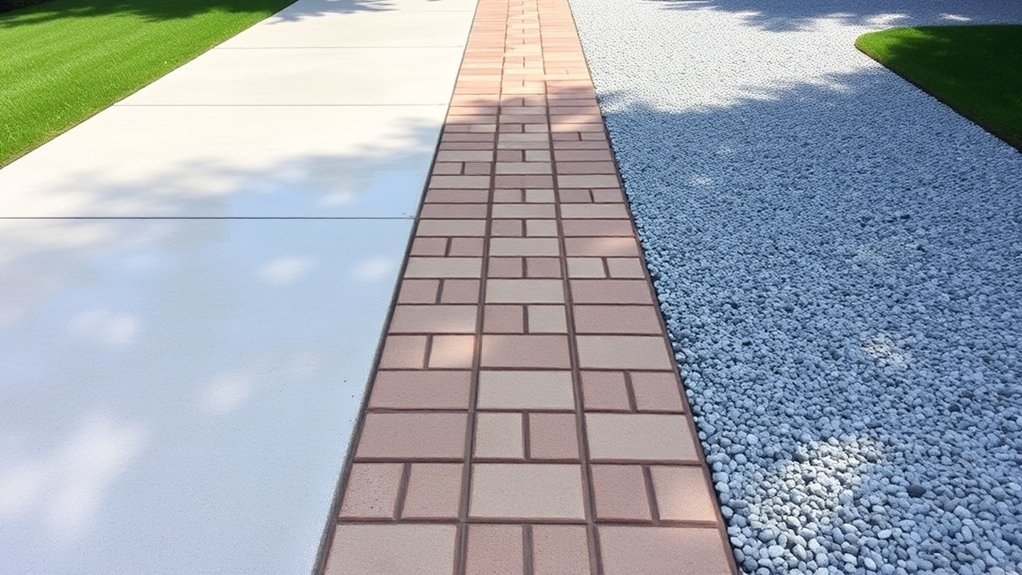
When selecting driveway materials, cleanliness is a key consideration as it impacts both the look and upkeep of your property.
Here’s a straightforward ranking based on cleanliness:
- Concrete Driveways: Smooth, durable, and easy to clean; minimal upkeep costs.
- Brick/Paver Driveways: Attractive and low-maintenance; may need occasional joint refilling.
- Asphalt Driveways: Sealed surfaces resist dirt but require resealing every few years; can show tyre marks.
- Gravel Driveways: Tends to be messy and requires regular maintenance; best suited for rural areas but has the least clean appearance.
Choosing the right material can improve your driveway’s visual appeal while keeping maintenance costs manageable.
Frequently Asked Questions
How Often Should I Clean My Driveway?
You should clean your driveway at least once a year for maintenance. If you experience heavy rain or snow, consider doing it twice a year. Adjust the frequency based on how often you use it and any visible stains. For instance, if you frequently park your car there, you might need to clean it more often.
What Are the Best Tools for Cleaning Driveways?
Think of a pressure washer as your go-to tool for tackling driveway grime. When combined with eco-friendly cleaners, it effectively removes dirt and stains, leaving your driveway looking as good as new. It’s a simple solution that makes a noticeable difference.
Can I Use Regular Household Cleaners on Driveways?
Yes, you can use household cleaners on driveways to remove stains. Eco-friendly options like vinegar and bicarbonate of soda are effective for general dirt, but for tougher stains, you may need to use commercial products for better results.
How Do Weather Conditions Affect Driveway Cleanliness?
Weather significantly affects the cleanliness of your driveway. Rain can lead to stains and promote moss growth, while UV rays may cause fading. To maintain your driveway’s appearance and longevity, regular upkeep is vital. Simple tasks like cleaning and sealing can make a big difference. For instance, a quick wash after heavy rainfall can help remove debris and prevent moss from taking hold.
Are There Specific Techniques for Cleaning Each Driveway Type?
Yes, different types of driveways require specific cleaning techniques. For proper maintenance, use the right detergents, pressure settings, and tools designed for concrete, asphalt, or block paving. This ensures effective cleaning and helps achieve long-lasting results. For instance, a pressure washer is great for concrete, while a gentle scrub with soapy water works well for block paving.
Conclusion
In the debate over driveway materials, block paving and brick driveways are the top contenders for cleanliness, often looking almost new after a thorough wash. Concrete requires reasonable upkeep, while asphalt can be trickier to maintain. Gravel, though attractive, tends to attract weeds and stains. By selecting the right material and using eco-friendly cleaning methods, you can keep your driveway in excellent condition. A tidy driveway not only boosts your home’s curb appeal but also simplifies your life!
Just how long can you expect your tarmac driveway to last? Discover key factors and maintenance tips that can extend Read more
Beneath the surface of tarmac and asphalt driveways lies a world of differences; discover which option suits your needs best.
Choosing between a tarmac and resin driveway can be challenging; discover the key factors that could influence your decision.

